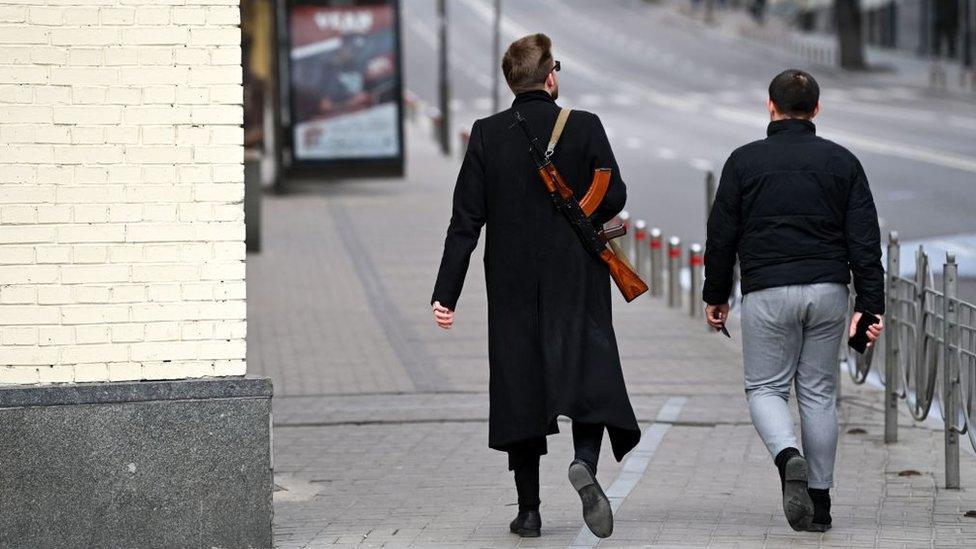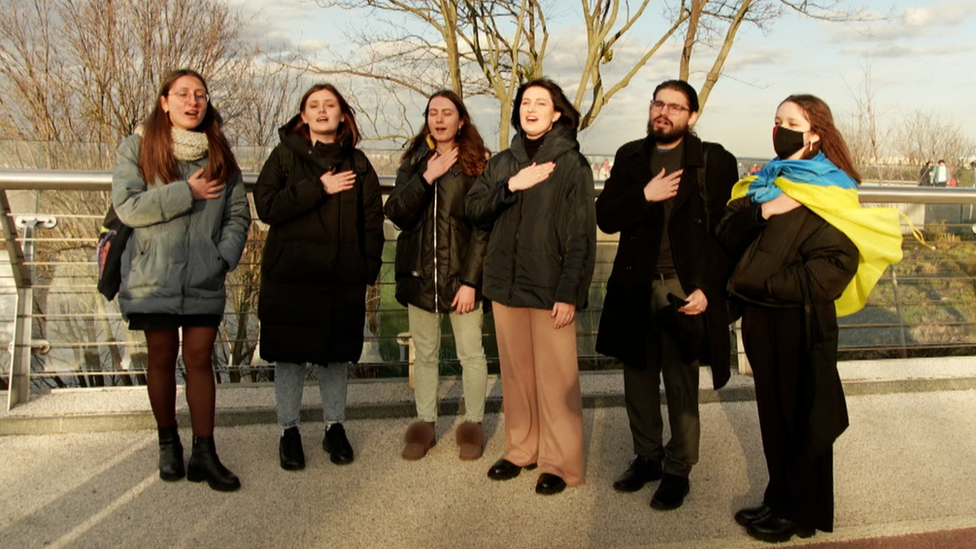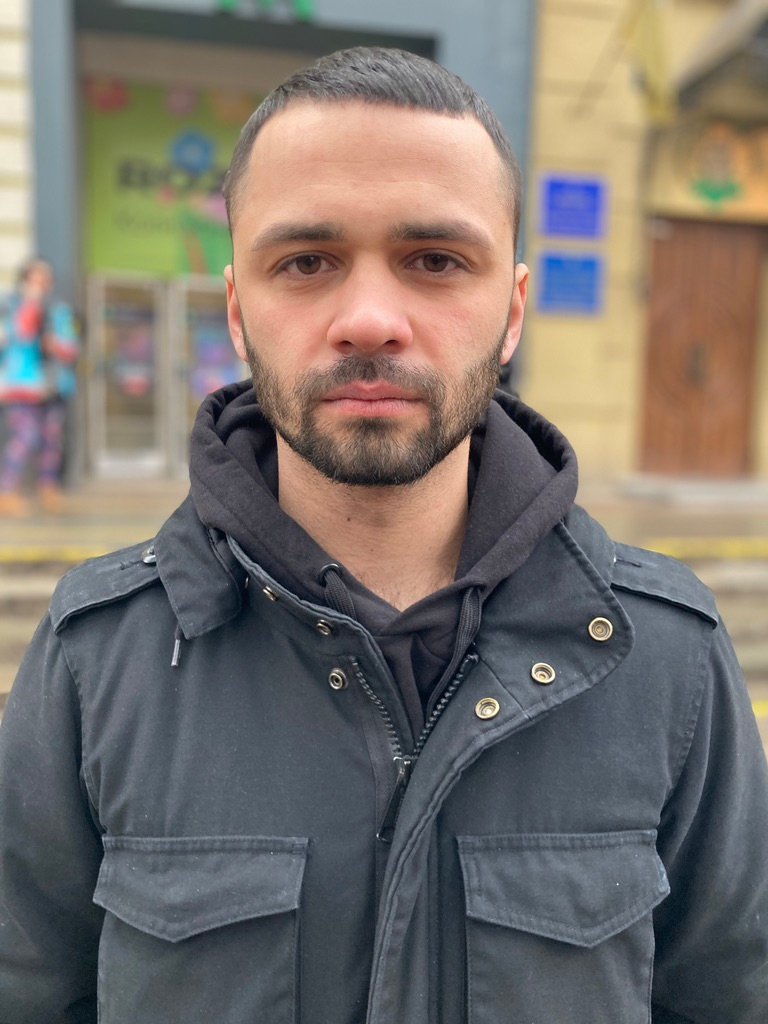Ukraine: Kyiv residents answer call to defend nation
- Published

Ukraine has been handing out weapons to civilians to defend Kyiv
The man tightly clutching a rifle at one roadblock could easily have been in his early 60s.
We saw other men, in jeans and trainers, taking up position: the luxury of camouflage protection not possible in this moment of crisis.
Makeshift roadblocks had been assembled.
As we ventured out into the streets of Kyiv on Friday, we encountered these men and others who had answered the call to defend their nation.
We found a tractor and a delivery truck parked at strategic angles to block the path of any incoming attacker.
In other cities, steelworkers are reported to have welded new obstructions into place: forging their own defences.
And workers in a sewing factory who normally stitch uniforms have been making sandbags.
Across the country, patriotic Ukrainians are weaving their own narrative and hoping their collective effort will count for something in the face of Moscow's military might.
The urgency of all this tells you many fear it is a question of when - not if - they'll be face-to-face with the advancing Russian forces.
Today, in the heart of the capital, the streets are mostly deserted. There are few people to enjoy the church bells.
One man who may have well heard the soothing chimes in this darkest hour is Ukraine's president.
In the midst of what feels like an existential battle, Volodymyr Zelensky has been carrying out a personal mission of his own: touring the landmarks of this great city recording defiant video messages to the Ukrainian people, vowing to stay and fight.
Zelensky's defiant response to invasion... in 100 seconds
Across this vast country, families have been sending their own hastily made films to their loved ones, reassuring them they are safe.
But there are no impressive architectural backdrops as in the president's videos. Instead you see the new subterranean existence many are being forced to endure: makeshift beds, piles of possessions, frightened pets.
Car parks, basements, metro stations are all now home for so many.
Daily life has been upended as they wait anxiously for the arrival of their would-be Russian occupiers.
However, it was new life that gave hope in one makeshift underground basement: a baby, delivered overnight, entering a world which has changed beyond recognition in barely 36 hours.

Russia attacks Ukraine: More coverage
THE BASICS: Why is Putin invading Ukraine?
IN MAPS: How Russia carried out the invasion
SANCTIONS: Who is not on UK list?

The sense this brutal conflict is a gruesome relic of a bygone age is shared by those enduring it first hand as well as those looking on in horror from afar.
An assault on a sovereign nation - a grim theme of 20th Century history - is unfolding before our eyes.
And a video has emerged seemingly showing a Tiananmen Square moment.
In it, a solitary figure shuffles round a tank trying to halt its path.
This is not 1989 and a Chinese tank. But a Russian instrument of war in 2022.
Another video I've just seen is too brutal to describe. So I won't try.
But let me tell you it shows the human cost - in sickening detail - of the aerial assault Vladimir Putin is inflicting on the military of his neighbour.
There are considerable losses on the Russian side too: far greater than the Kremlin had anticipated or would acknowledge, is the latest assessment of the UK Ministry of Defence.
Earlier in the week, when it looked like a strike would indeed finally come, we found cheerful defiance in Kyiv.
In hindsight, most thought Putin may look to expand his control in the Donbas region, hundreds of miles to the east.
As we know now, it was so much bigger than that.
On Tuesday, we watched a group of history students gather on a bridge and sing their national song, some with the blue and yellow of the Ukrainian flag draped over their shoulders.
There were broads smiles and a joyful unity.

A group of students recited the national hymn
That unity has not shattered but the ready smiles are much harder to find.
But there is not despair.
As well as the joy of new life arriving in one bunker, there are stories of basic human kindness beneath the city's streets.
On Thursday morning, before the fog of disbelief at the size and scale of Moscow's offensive had lifted, I met Mark, a sales manager outside one metro station.
He had been woken by the first round of explosions and then helped his neighbours evacuate their building.

Mark is preparing for the long haul

In my latest exchange of messages with him, he tells me he's now formed his own subterranean band of brothers and sisters.
They've been encouraged by the Kyiv authorities to make petrol bombs to repel any Russian advance.
But for now, Mark's makeshift army is not on the frontline, but the platform edge.
He tells me they're helping each other in their new surroundings and in particular, have been searching for people who are alone.
"There are tears - lots of them," he writes.
"But I can say with joy in my heart that that everyone here has faith in Ukraine."
He says last night they sang hymns.
"There will be victory and everyone will contribute to this victory."
Kyiv is a city under strain and under fearsome attack.
But it feels united in spirit and strength and an indominable determination to survive.